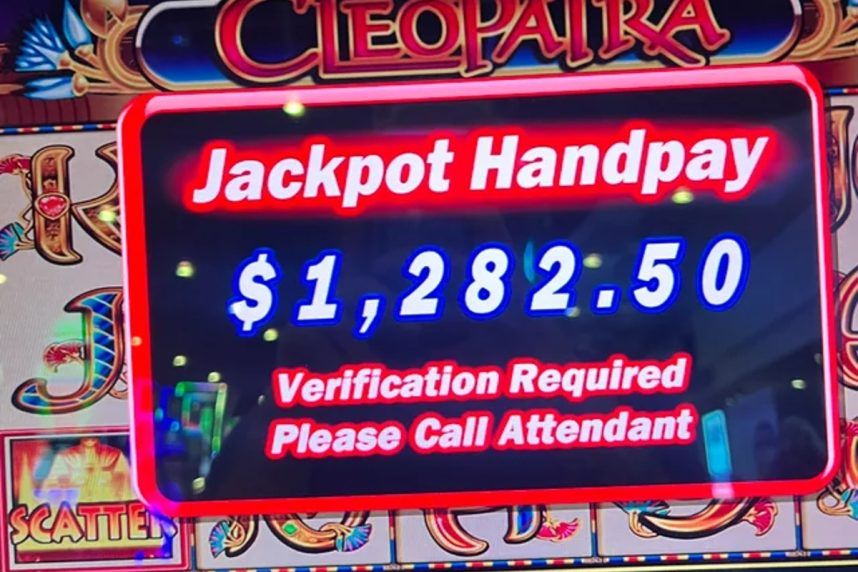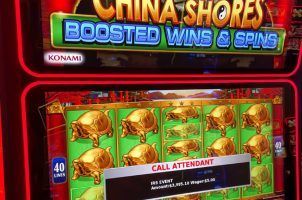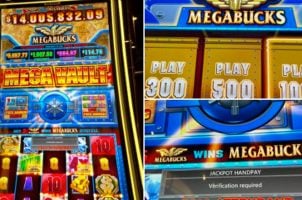IRS Commissioner Says Increase to Slot Tax Threshold ‘Under Serious Consideration’
Posted on: May 14, 2024, 09:34h.
Last updated on: May 14, 2024, 09:39h.
The top official at the Internal Revenue Service (IRS) has lent his support to raising how much a slots gambler can win before a casino must issue the player a W-2G filing form to report the winnings as taxable income.

Under the current federal rule, a payer or casino must provide a slots player with a W-2G form when they win $1,200 or more on a slot machine. The jackpot threshold has remained at $1,200 since it was implemented in March 1977.
Appearing before a House Appropriations subcommittee in Washington, DC last week, IRS Commissioner Danny Werfel seemed supportive of increasing the slot threshold. Werfel revealed he’s embraced a November recommendation from the IRS Advisory Council suggesting the amount be elevated to $5,800.
I think it’s very valuable when we get input from the taxpaying community and our Advisory Council on when thresholds may be out of date,” Werfel said in response to a question about the topic posed by House Appropriations Financial Services and General Government Subcommittee Chair Rep. David Joyce (R-Ohio). “The determination of something like that is of regulatory nature and therefore the decision rests with the Treasury’s Office.”
Werfel added that he knows the IRS Advisory Council’s recommendation “is under serious consideration” at the Treasury.
Long Overdue
US Reps. Dina Titus (D-Nevada) and Guy Reschenthaler (R-Pennsylvania) have been at the forefront in Washington urging regulatory action at the Treasury to increase the slot tax threshold. They’ve introduced legislation to take the matter into their own hands if change doesn’t come.
In 2022, Titus and Reschenthaler introduced the “Shifting Limits on Thresholds Act,” cleverly abbreviated the “SLOT Act.” The two leaders of the Congressional Gaming Caucus, where Joyce also sits, say the $1,200 threshold creates unnecessary overhead and paperwork for casinos, disrupts the player’s gaming experience, and takes a slot machine offline.
The purchasing power of $1,200 in 1977 is today equivalent to about $6,200. The SLOT Act has been reintroduced to Congress and proposes increasing the threshold to $5,000.
“Because the threshold has not kept up with inflation, it has resulted in a drastic increase in reportable jackpots, which trigger tax burdens for winners and compliance burdens for casinos,” explained Reschenthaler. “Increasing the threshold will eliminate this onerous red tape, ensuring the gaming industry can continue to support good-paying jobs, and foster economic growth in Pennsylvania and across the country.”
Slot Attendants Concerned
While casinos and the gambling public might be supportive of increasing the tax threshold for slot wins, there is a possible downside in that slot attendants could see reduced jobs and pay.
Slot attendants are casino workers who respond to a slot jackpot upwards of $1,200 to provide the winner with their W-2G form and pay out their winnings. It’s customary that the winner tip the slot attendant.
As a slot attendant, this would destroy our income,” a slot attendant named Sam told Casino.org.
Sam estimated that less than 5% of slot jackpots he responds to are over $5,000.
“This would be life-changing in a bad way for many workers like myself who have been in the industry for years,” he added.
Related News Articles
Slot Tax Threshold Increase Supported by IRS Advisory Council
VEGAS MYTHS RE-BUSTED: The Megabucks Curse
Most Popular
FTC: Casino Resort Fees Must Be Included in Upfront Hotel Rates
Genovese Capo Sentenced for Illegal Gambling on Long Island
NBA Referees Expose Sports Betting Abuse Following Steve Kerr Meltdown
UPDATE: Former Resorts World & MGM Grand Prez Loses Gaming License
Most Commented
-
UPDATE: Whiskey Pete’s Casino Near Las Vegas Closes
— December 20, 2024 — 30 Comments -
Caesars Virginia in Danville Now Accepting Hotel Room Reservations
— November 27, 2024 — 9 Comments -
UPDATE: Former Resorts World & MGM Grand Prez Loses Gaming License
— December 19, 2024 — 8 Comments -
FTC: Casino Resort Fees Must Be Included in Upfront Hotel Rates
— December 17, 2024 — 7 Comments
















Last Comments ( 5 )
With the change over in the deductions only being aloud to be claimed on long form filings this is un fair. Those that don't have enough deductions to claim long form but those that have to pay taxes on this when filing short form is very unfair to us also we can only write off if filing long form can only be claimed up to the amount we lost. What about the additional money showed on win loss that we have shown. This definely needs updated to be far to all. If showing win loss statement should also be loud to take off up to this amount with filing short forms. But with the inflation this definetly needs to be raised.
I won $1000. last year and WindCreek issued me a 1099 in the mail. Bastids!
If this does go through I'm sure the software update to the slot machines will happen in record time.
Well I live in Tx. as you know gambling is not permitted here and I wonder how can Tx. Collect taxes for something that’s illegal in the state.The average citizen usually always have a loss more than not.Also it’s sad for seniors because they are so afraid that their income from the same government that states it’s is an illegal activity in their state will force their only income will be in jeopardy.Therefore 5,000 or more should be allowed to increase without any compromise standing in the way.As you know as a company you will always come out ahead.Thank You Kindly Mrs.Anna (I loss 5,000 dollars last month)(Will I recoup that money).
Oh come on slot attendants are salaried, everybody wants a tip. Finally good news from the IRS!